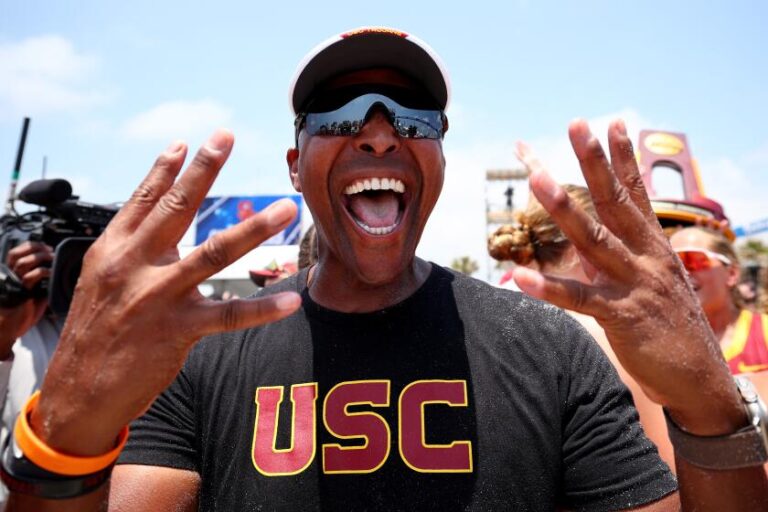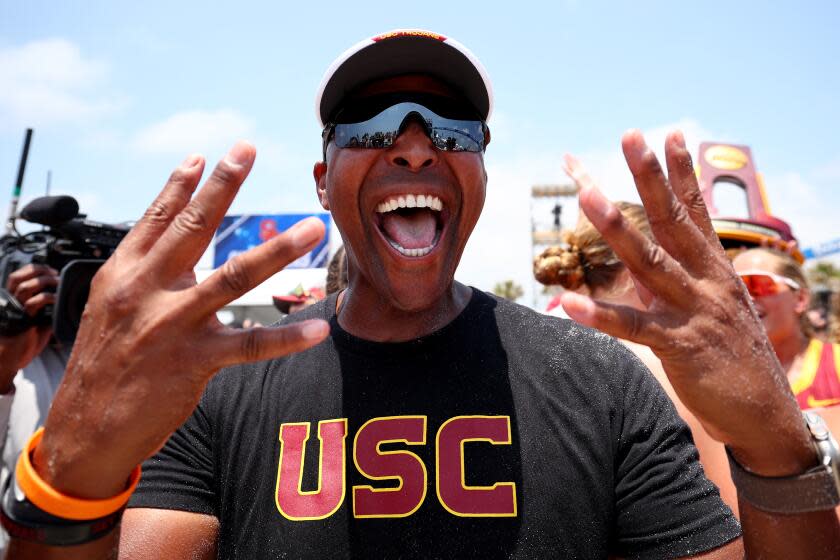
Before he built a beach volleyball dynasty, Dain Blanton had decided in the summer of 2018 to put coaching on the back burner.
After four years as a volunteer assistant, it felt like he’d hit his ceiling at USC. Anna Collier, the only head coach USC beach volleyball ever had, didn’t seem likely to move on any time soon. And ESPN, where Blanton worked on volleyball coverage, was offering him a chance to commit to a career in broadcasting, not to mention financial stability. With a new baby to think about, it felt like the right time to move on.
Blanton loved coaching. But he was ready for something new, and his broadcast career, which included work as a Clippers sideline reporter and Olympics analyst, seemed primed to take off. Still, during the next year, Collier checked in to remind Blanton not to close the door completely on coaching — not knowing, at the time, that she would retire from USC the following summer.
Stunned by the news, Blanton wondered if he’d have a shot. “Everyone and their brother wanted the job,” he said.
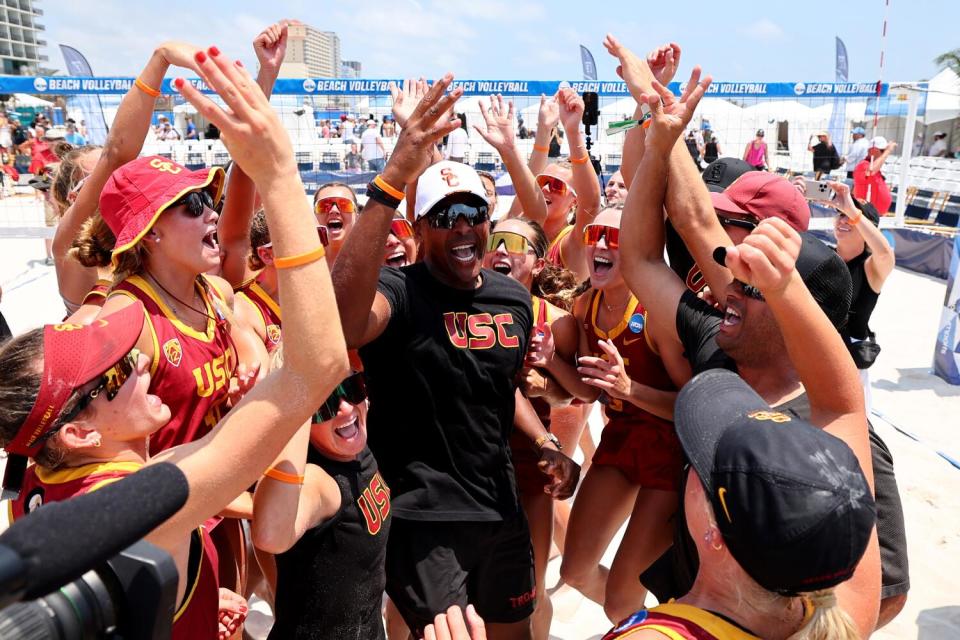

But Collier, who helped pioneer beach volleyball as an NCAA sport while coaching at USC, had no doubt about who should take her place. Collier says she reiterated those thoughts to USC leaders, some of whom weren’t sold on hiring someone so inexperienced.
“I felt very strongly that Dain should be the guy,” Collier said.
Five years later, Collier stood on the sand in Gulf Shores, Ala., watching as USC clinched its fourth consecutive national title under Blanton, a streak that stands alone not only in NCAA beach volleyball, but also in the decorated history of all women’s athletics at USC. Just one other women’s sports program at USC — tennis from 1977-80 — has won four consecutive national titles. The 45 years since have yielded only two such runs of any kind at USC, from its men’s tennis team (2009-12) and men’s water polo (2008-13) teams.
Blanton spent the entire season trying to minimize the significance of that number to his team. But looking back, he couldn’t help but marvel a bit at the history they’d made.
“You see three-peats every once in a while,” Blanton said. “But you don’t see four-peats anywhere. Not in the modern day of any sport.”
Read more: USC defeats UCLA for fourth straight women’s beach volleyball title
It’s a run made all the more impressive by the fact that the man leading it had never led a team or program at any level before. Of the seven coaches in USC history who’ve won four straight national titles, Blanton is the first to do so in his first four chances as coach.
And at USC, no one sees any reason that streak can’t continue, even as the sport grows and investments pour into collegiate programs across the country. They point to the endless talent pool in Southern California and the culture Blanton has cultivated, which has so far managed to root out any sense of complacency within the powerhouse program before it takes hold.
“There’s no ceiling on USC beach volleyball,” says Nicole Nourse, a captain on the 2024 team. “I think they could go for five next year. Maybe six.”
As Collier watched Blanton walk the beach last weekend, she found herself thinking about how far her former assistant had come since he started as coach. She’d seen something in him then. But he’d exceeded every reasonable expectation since — except, apparently, for her own.
“I always knew he would do this,” she said. “There’s no end in my eyes for him at USC. I think he can stay there the rest of his life, if he wants to.”
When Collier first suggested Blanton take her place, decision makers at USC had one major concern.
“They were definitely not thrilled about his lack of head coaching experience,” Collier said.
The reasons for that concern were mostly administrative. Blanton had never dealt with recruiting or compliance or any of the other critical facets of running a college program. As a volunteer, he was only allowed to provide volleyball instruction.
Collier assured that Blanton could learn on the job. But USC still tried a few more experienced candidates before circling back to Blanton.
“Pretty sure some of the other candidates might not have worked out,” Blanton said. “My resume was very strong, but it didn’t check one box.”
His reputation around the sport certainly preceded him: All-American indoor player at Pepperdine, where he won a national title in 1992. Olympic gold medalist on the beach in Sydney in 2000. The first two-time male Olympian in beach volleyball. The first Black volleyball player to win a major pro beach event (1997 Hermosa Beach Open)
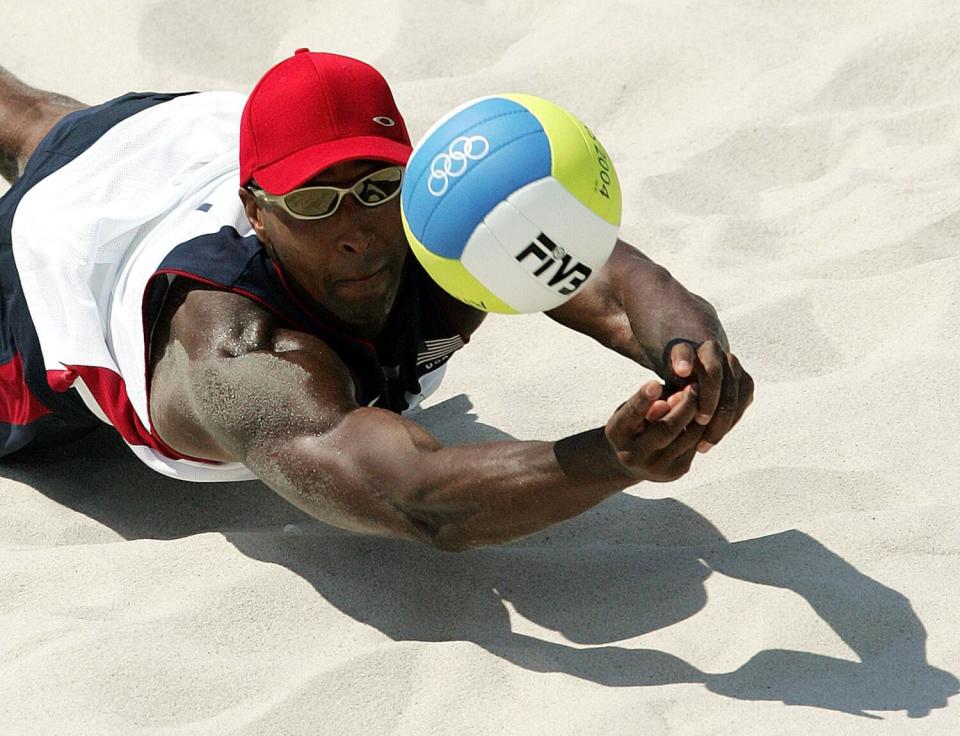

As a coach, though, he was totally unproven. Most of Blanton’s work had been with pairs, including the most recent world champions, Sara Hughes and Kelly Cheng. Now he was at the helm of a full program that had won two of the first four NCAA national titles. And he was allowed only one assistant on his staff to help.
“Dynamics on teams are different, and he had to learn some of that. But he did,” said Robin Scholefield, USC’s senior associate athletic director of sports psychology. “He didn’t waste any time. And he’s very receptive to feedback. He asks everyone a lot of questions.”
But from the beginning of his tenure, players and administrators say Blanton had an innate understanding of how to manage the team and the mental aspect of his job. He’s a picture of beachy, California cool, rarely ever wavering from his even keel.
He focused on his strength as a player and applied them as a coach. He taught his team how to best read their partner and be aware of their specific needs — down to how you can buy time by asking for permission to clean your glasses.
When it came to keeping calm amid pressure, he introduced his players to creative visualization, which he used as a player.
“You’re putting yourself in that environment. You’re feeling the wind,” Blanton said. “Then, later, the mind thinks, ‘Hey, I’ve been here before.’”
Read more: Blanton Rediscovers Winning
That point is tantamount to Blanton’s philosophy as a coach. So much so that it’s captured on a quote that’s posted in his office.
“Everything is important, but nothing is special.” The quote has become somewhat of an unofficial slogan during the past four years at USC, as Blanton has approached USC’s unprecedented streak by giving it as little power as possible.
That was especially true this past season. After USC won its third straight national title in 2023 during what some around the sport expected would be a “rebuilding” year, Blanton and his top assistant Gustavo Rocha refocused their efforts on isolating the upcoming season as much as possible from others before it. They say they never directly addressed the pressure of going for a four-peat.
“Those years are done,” Blanton said. Nobody can take those from you. Put them away. Now it’s about this year.”
That’s easier said than done, of course. Especially when it comes to managing the expectations and egos of a team where only half the players will play on a given week.
“It came up a lot this year,” Rocha said. “But as we always talk about and tell the players, nothing is personal. It’s all objective. We’re going to play the best.”
That philosophy has, at times, emboldened Blanton to make big changes to his lineup late in the season. With each collegiate beach volleyball match worth a single point in a single-elimination, best-of-five format, how pairings are deployed can either unlock a team or upset its delicate balance.
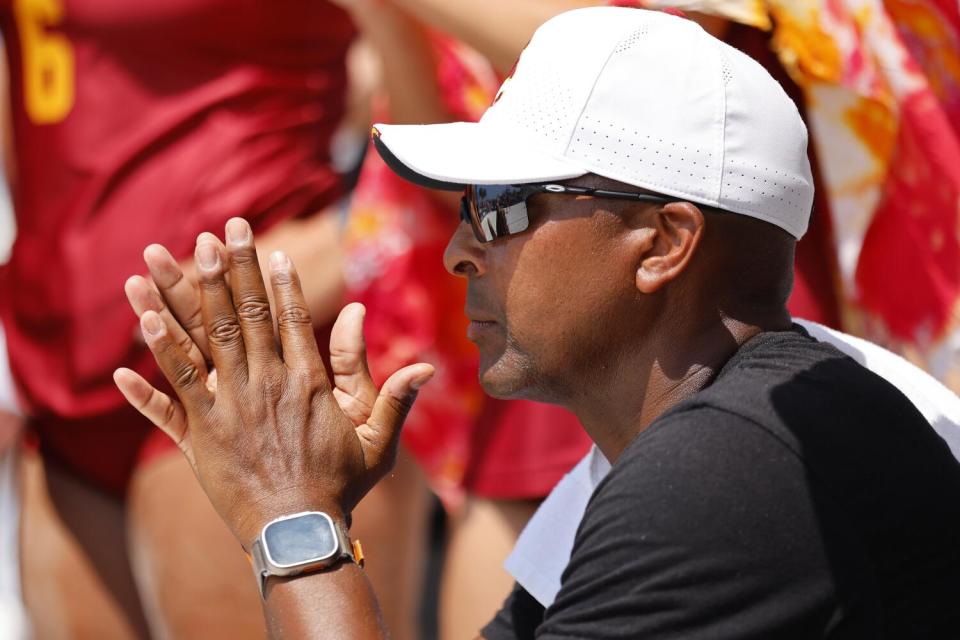

“Those nuances are the differences between good coaching and great coaching,” Blanton said. “That relationship, where you know what your players need, you have to have your finger on the pulse, or you’re in trouble.”
Midway through the 2021 season, he changed his lineup to pair future Olympian Tina Graudina with an unproven freshman, Megan Kraft. They won 14 of their 15 matches as USC’s top pair on their way to the title.
“People probably thought Dain was crazy at the time,” Nourse said. “But it worked.”
Just before the NCAA tournament in 2023, with USC seeded third, Blanton inserted Jenna Johnson into the lineup after she’d spent months in concussion protocol. Johnson and her partner delivered two critical wins in the semifinals and finals.
Late this season, he shuffled the deck again, moving two of his most proven leaders — twins Nicole and Audrey Nourse — down to the No. 3 pair, while splitting up two experienced grad students to pair them with younger players. The teams ultimately delivered critical points in the title game.
“It just completely bolstered our lineup,” Audrey Nourse said of the change this season.
The Nourse twins, in their fifth and final season, delivered the deciding blow last weekend to UCLA during the championship. Their match, as the No. 3 pair, extended to a third game. All five of USC’s championship matches had reached that point — the first time in NCAA title history that’s happened — but during critical moments, the new pairs Blanton crafted delivered. Then, after playing to a 9-9 tie in the third game, the twins pulled away. A block from Nicole Nourse handed USC the title-winning point.
Tears streamed down their faces. Adulation poured out onto the beach. The team took its ceremonial dip into the gulf after the win. Later, they strapped the NCAA trophy into a seat on their chartered flight. It was, Nicole said, “pure bliss.” The twins would leave USC having won a national title every year that they could, a feat few college athletes could ever claim.
But a few days later, their training from the past four years with Blanton had kicked in. Their fourth title, they said, felt no different than the first. And all of them were now in the rearview.
“Winning four,” Nicole said, “I guess I’m kind of numb to it.”
Jennifer Cohen made it beachside half an hour before the championship match was set to start. She had to take a red-eye from Los Angeles to Gulf Shores to get there in time for her first NCAA championship as USC’s athletic director.
“Nothing was going to stop me from being there,” Cohen said.
Since taking the job last August, she’d seen enough to understand what USC had in Blanton. He’d built a program she called “the gold standard” at USC. But keeping up that standard certainly requires more than just moral support.
It starts, first and foremost, with keeping Blanton happy. A contract extension after last season already made him the second-highest paid coach in collegiate beach volleyball. Another title presumably would mean another pay bump. But Blanton has other ideas for how to help the program, including pushing for additional beach-only scholarships.
Cohen, when asked about extending Blanton’s contract, said USC would “reevaluate that on a yearly basis.”
“Retention of your great coaches is a constant thing you’re thinking about as an athletic director,” Cohen said.
As college programs across the country begin to invest more heavily in beach volleyball, the gap between the Trojans at the top and the schools chasing them narrows. Since Blanton started as a volunteer assistant in 2013, the number of Division I schools playing beach volleyball has nearly doubled. Where USC was the first to have its own beach facility, others have since followed with bigger, shinier stadiums. USC’s team, meanwhile, still has to walk across Figueroa Street to use a locker room at Galen Center.
But in Blanton, USC has a coach who has built something to last. Even if that might not mean winning a national championship every season.
“He’s not going to win forever,” Collier said. “Let’s face the facts.
“But he loves what he does. It’s in his soul now. You can see it. And as long as that’s there, I think he’ll be there for a long time.”
Get the best, most interesting and strangest stories of the day from the L.A. sports scene and beyond from our newsletter The Sports Report.
This story originally appeared in Los Angeles Times.

